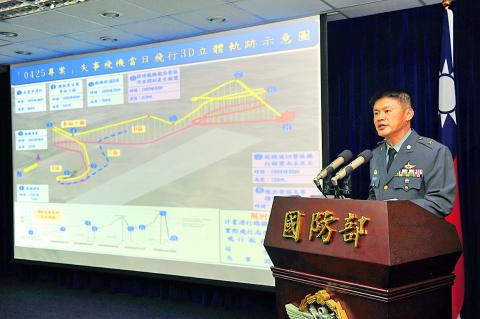The timetable for the nation’s AH-64E Apache attack helicopters to become fully operational has not been affected by a chopper crash in northern Taiwan in April, an army official said yesterday.
“The Apaches will become operational in 2017” as scheduled, Major General Chen Chien-tsai (陳健財), deputy commander of the Republic of China Army Aviation Special Forces Command, said at a news conference to present the conclusions of the army’s investigation into the accident.
The chopper, one of 18 that have been delivered to Taiwan by the US since November last year, was on a training mission on April 25 when it crashed into the top of a three-story residential building in Taoyuan County’s Longtan Township (龍潭), damaging four homes, but causing no serious injuries.

Photo: Lo Pei-der, Taipei Times
Asked whether the incident had affected the delivery schedule of the other 12 Apaches to Taiwan, Chen said it had not.
The fourth batch of Apache helicopters is set to arrive in August, while the final batch is expected to be delivered in October, he said.
They are part of a NT$59.31 billion (US$2.01 billion) order for 30 of the latest Apache model.
The army said environmental factors and human error were found to be the main causes of the helicopter crash and that mechanical failure had been ruled out.
The aircraft was enveloped in cloud during a training mission at an altitude of 120 feet (36.6m) as the cloud ceiling dropped suddenly to below 200 feet, said Major General Huang Kuo-ming (黃國明), deputy inspector-general of the army.
This affected visibility and led to spatial disorientation of the pilot, Major Chen Lung-chien (陳龍謙), a flight instructor who was flying the helicopter at the time, Huang said.
However, he said Chen should have relied on his flight instruments to keep track of the aircraft’s altitude and direction.
Spatial disorientation refers to the inability of a person to determine his true body position, motion and altitude relative to the ground or his surroundings.
Chen and the other pilot on the ill-fated Apache, Lieutenant Colonel Liu Ming-hui (劉銘輝), have been suspended since the incident and have also been receiving counseling to help them recover from the incident, the army said.
They will be able to fly again after a series of evaluations, a process that could take up to six months, Chen said.
On the question of seeking compensation from the US since the Apache helicopter was still under its 18-month warranty, Huang said the ministry was studying that possibility.
Speaking on condition of anonymity, an army official said that although mechanical failure has been ruled out, the US may be seen as responsible for not training Taiwanese pilots properly on how to deal with sudden climate changes, like those that occurred on the day of the crash.
The US and Taiwan are the only two countries that use AH-64E Apache helicopters.

Taiwan is projected to lose a working-age population of about 6.67 million people in two waves of retirement in the coming years, as the nation confronts accelerating demographic decline and a shortage of younger workers to take their place, the Ministry of the Interior said. Taiwan experienced its largest baby boom between 1958 and 1966, when the population grew by 3.78 million, followed by a second surge of 2.89 million between 1976 and 1982, ministry data showed. In 2023, the first of those baby boom generations — those born in the late 1950s and early 1960s — began to enter retirement, triggering

ECONOMIC BOOST: Should the more than 23 million people eligible for the NT$10,000 handouts spend them the same way as in 2023, GDP could rise 0.5 percent, an official said Universal cash handouts of NT$10,000 (US$330) are to be disbursed late next month at the earliest — including to permanent residents and foreign residents married to Taiwanese — pending legislative approval, the Ministry of Finance said yesterday. The Executive Yuan yesterday approved the Special Act for Strengthening Economic, Social and National Security Resilience in Response to International Circumstances (因應國際情勢強化經濟社會及民生國安韌性特別條例). The NT$550 billion special budget includes NT$236 billion for the cash handouts, plus an additional NT$20 billion set aside as reserve funds, expected to be used to support industries. Handouts might begin one month after the bill is promulgated and would be completed within

NO CHANGE: The TRA makes clear that the US does not consider the status of Taiwan to have been determined by WWII-era documents, a former AIT deputy director said The American Institute in Taiwan’s (AIT) comments that World War-II era documents do not determine Taiwan’s political status accurately conveyed the US’ stance, the US Department of State said. An AIT spokesperson on Saturday said that a Chinese official mischaracterized World War II-era documents as stating that Taiwan was ceded to the China. The remarks from the US’ de facto embassy in Taiwan drew criticism from the Ma Ying-jeou Foundation, whose director said the comments put Taiwan in danger. The Chinese-language United Daily News yesterday reported that a US State Department spokesperson confirmed the AIT’s position. They added that the US would continue to

One of two tropical depressions that formed off Taiwan yesterday morning could turn into a moderate typhoon by the weekend, the Central Weather Administration (CWA) said yesterday. Tropical Depression No. 21 formed at 8am about 1,850km off the southeast coast, CWA forecaster Lee Meng-hsuan (李孟軒) said. The weather system is expected to move northwest as it builds momentum, possibly intensifying this weekend into a typhoon, which would be called Mitag, Lee said. The radius of the storm is expected to reach almost 200km, she said. It is forecast to approach the southeast of Taiwan on Monday next week and pass through the Bashi Channel